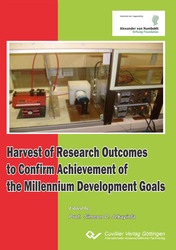| Departments | |
|---|---|
| Book Series (97) |
1383
|
| Nachhaltigkeit |
3
|
| Gesundheitswesen |
1
|
| Humanities |
2379
|
| Medienwissenschaften | 16 |
| Theology | 57 |
| Philosophy | 102 |
| Law | 424 |
| Economics | 856 |
| Social sciences | 418 |
| Sports science | 48 |
| Psychology | 233 |
| Educational science | 190 |
| History | 183 |
| Art | 111 |
| Cultural studies | 167 |
| Literary studies | 117 |
| Linguistics | 89 |
| Natural Sciences |
5409
|
| Engineering |
1799
|
| Common |
97
|
|
Leitlinien Unfallchirurgie
5. Auflage bestellen |
|
Advanced Search
Harvest of research outcomes to confirm achievement of the millennium development goals (English shop)
Simeon O. Jekayinfa (Editor)Preview
Table of Contents, PDF (120 KB)
Extract, PDF (320 KB)
In 2000, the leaders of member states of the United Nations adopted the Millennium Declaration, which set out a series of clear commitments, goals and targets to achieve Human Development. These ambitious goals were subsequently refined into eight Millennium Development Goals (MDGs), designed to provide a framework for accountability, donor coordination and resource mobilization. The MDGs are: Eradicate extreme poverty and hunger; achieve universal primary education; promote gender equality and empower women; reduce child mortality; improve maternal health; combat HIV/AIDS, malaria and other diseases; ensure environmental sustainability; and develop a global partnership for development.
The first seven of these Goals are concerned with outcomes, identifying the progress towards certain standards of human well-being and decent living which should be achieved globally and nationally by 2015. The eighth Goal is concerned with relationships, identifying various aspects of a “global partnership for development” which must be forged to support the realization of these poverty reduction, human development and environmental sustainability standards. The MDGs provide opportunities to start working from real-life development problems. Addressing these problems requires multidisciplinary approaches that combine the natural sciences, the life sciences and technical approaches with social-science approaches. The challenge is to integrate social, economic, political and institutional concerns into research strategy. To be able to achieve this, there is a need to establish a linking pin between research, policy and practice in Nigeria.
The aim of such a linking pin would be to synthesize research outcomes on specific MDGrelated topics and to translate these into implications for policy – and decision – making through easily accessible gathering where individual stakeholders can air their views. The articles contained in this book address research outcomes from stakeholders (Sociologists, Economists, Agronomists, Agricultural Engineers, Civil Engineers, Environmental Scientists and Engineers, Geographers, Geologists, Microbiologists, Medical Practitioners, Policy Makers, Educationists, etc.) to confirm achievement of Millennium Development Goals in Nigeria and other neighboring countries.
| ISBN-13 (Hard Copy) | 9783736996168 |
| ISBN-13 (eBook) | 9783736986169 |
| Final Book Format | A5 |
| Language | English |
| Page Number | 424 |
| Edition | 1. |
| Publication Place | Göttingen |
| Publication Date | 2017-09-15 |
| General Categorization | Non-Fiction |
| Departments |
Economic and social policy
Educational science Agricultural science Energy engineering |
| Keywords | Millennium Declaration, Human Development, poverty, education, gender equality, mortality, health, environment |








